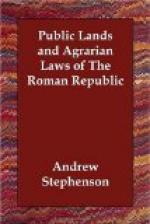2. It reveals the profound modifications which Roman customs had passed through. The riches which began at this time to flow into Rome by reason of the many successful wars revolutionized the economic conditions of the city. It is not necessary to see only a proof of corruption in this tendency of all classes to grasp for riches and to desire luxury and ease. We must also consider that comfort was more accessible and that the price of everything, especially of the necessaries of life, had increased. In consequence of this it was difficult for soldiers to support themselves with their pay. The presents of a few sesterces given them as prize money in no way made sufficient recompense for all the miseries and privations which they had passed through during their long absence. Grants of land were the only means of recompensing their military services. This is the first example that we have found of soldiers being thus rewarded, and it consequently initiated a custom which became most frequent especially in the time of the empire. Upon the conquest of Italy which followed the expedition of Pyrrhus, the Romans found themselves led into a long series of foreign wars; Sicily furnished the stepping-stone to Africa; Africa to Spain; all these countries becoming Roman provinces. As soon as the second Punic war closed, Hannibal formed an alliance with the king of Macedonia. A war-cloud rose[18] in the east. The AEtolians asked aid from Rome, and statesmen could foretell that it would be impossible for Roman armies not to interfere between Greece and Macedonia. But these countries had been from ancient times most intimately connected with the orient, i.e., Asia, where the Seleucidae still ruled, so that a war with Greece, which was inevitable, could not fail to bring on a war with the successors of Alexander, and, these hostilities once engaged in, who could say where these accidents of war would cease, or when Roman arms could be laid aside? In this critical condition it was prudent to attach the soldiers to the republic by bonds and interests the most intimate, to make them proprietors and to assure subsistence to their families during their long absence. These wars did not much resemble those of the early republic which had for a theatre of war the country in the immediate vicinity of Rome.
The senate continued to take the initiative in agrarian movements. In 172, after the close of the wars against the Ligurians and Gauls, we again see the senate spontaneously decreeing a new division of the lands. A part of the territory of Liguria and Cisalpine Gaul was confiscated and a senatus consultum ordered a distribution of this land to the commons. The praetor of the city A. Atilius, was authorized to appoint decemvirs, whose names Livy gives, to assign ten jugera to Roman citizens and three jugera to Latin[19] allies. Thus the senate, with a newly-born sagacity, rendered useless the demands of the tribune and recognized the justice and the




